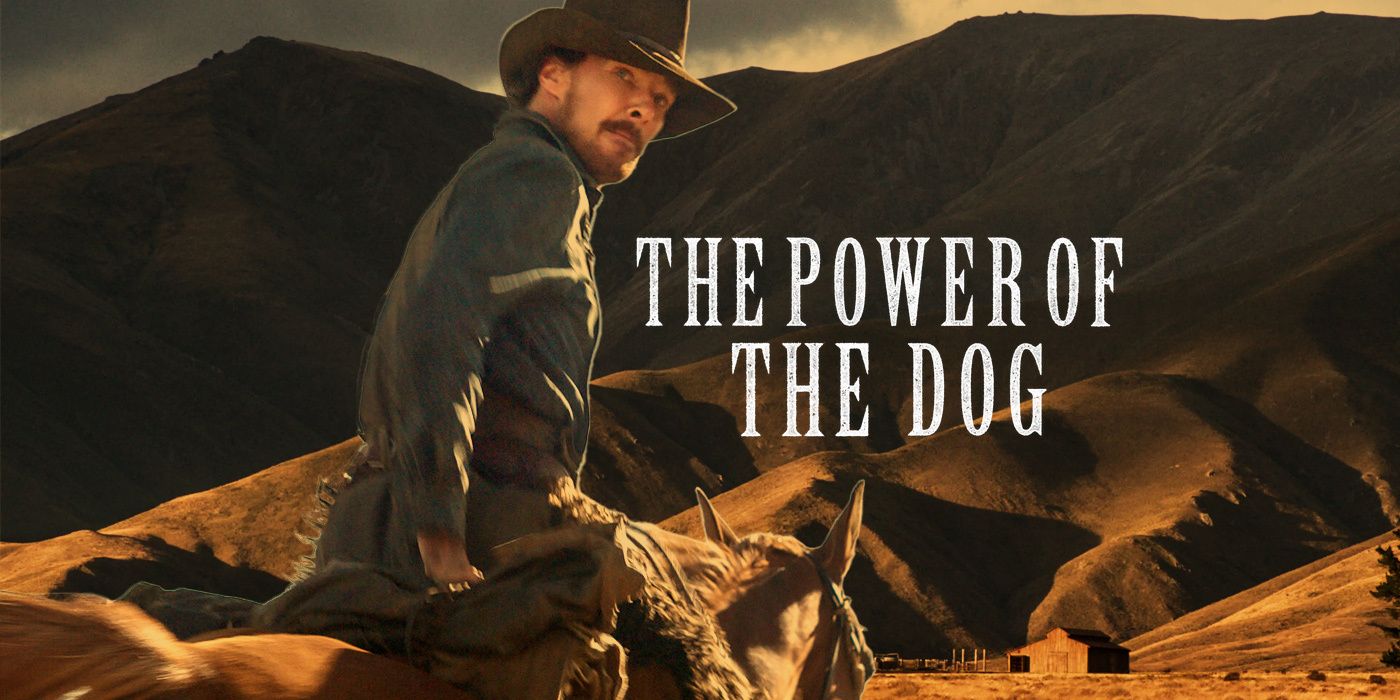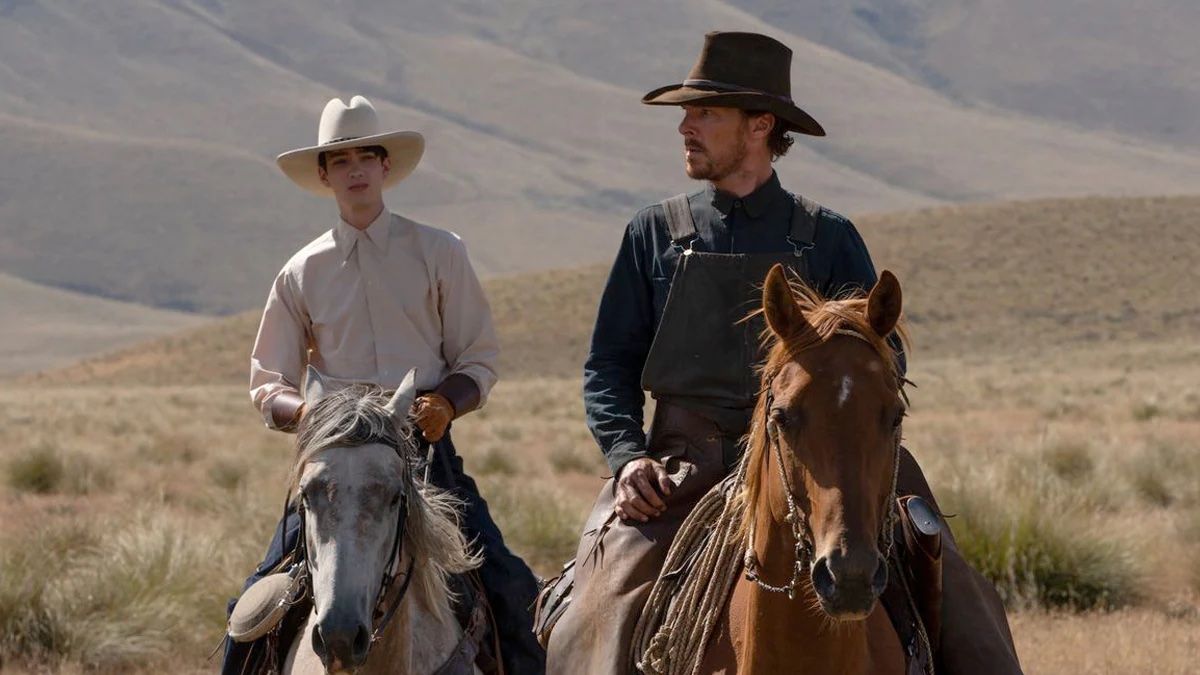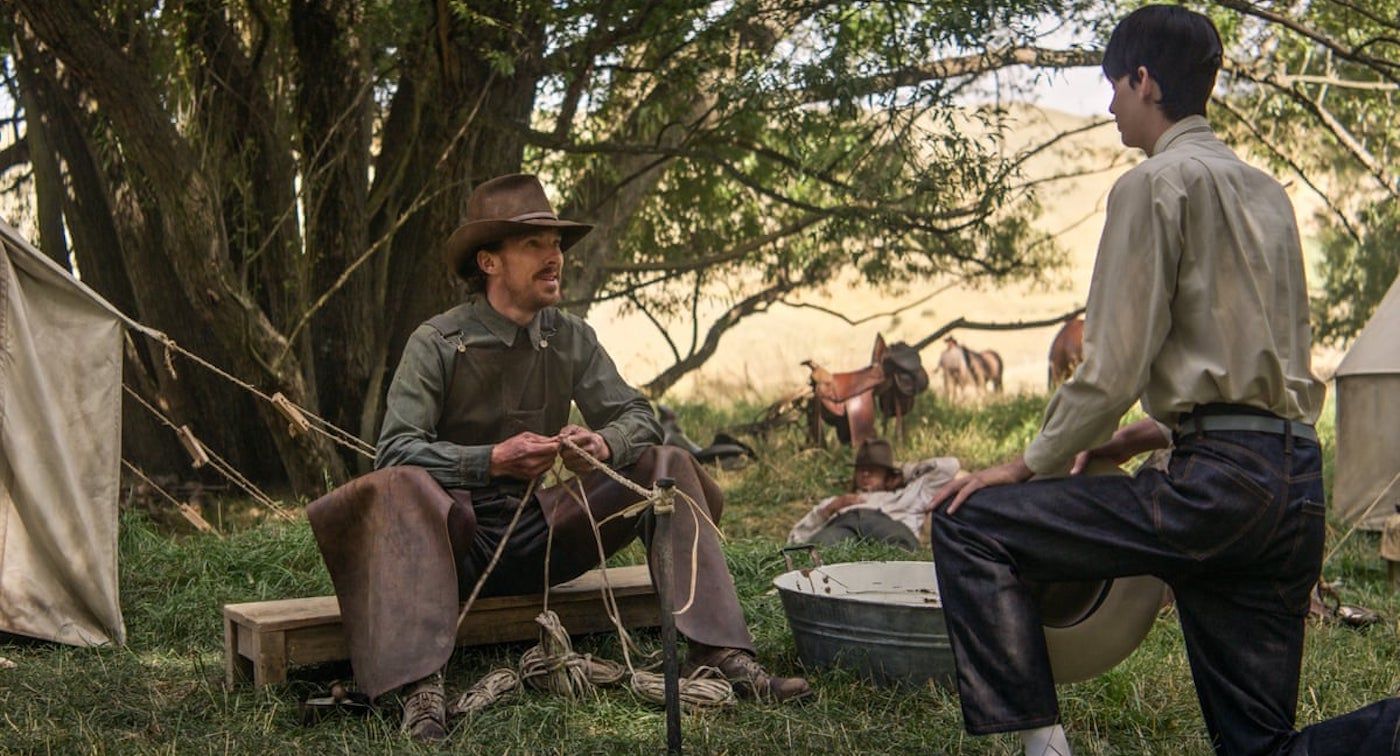Phil Burbank is a man, and Phil Burbank is a cowboy. As far as he’s concerned, those two words might as well mean the same thing. According to Phil, the malevolent rancher played by Benedict Cumberbatch in The Power of the Dog, to be a man is to work long hours doing manual labor, steering herds, and castrating bulls. Men don’t wear suits. Men don’t wear gloves when working. Men don’t bathe indoors or show affection towards women. Men don’t show affection towards anybody, except for Bronco Henry (Phil’s beloved, deceased mentor in the ways of the cowboy.) Above all else, men are stoic: they completely reject all things emotional, feminine, or soft.
Phil regards anyone who doesn’t meet his rigid criteria for manhood with withering scorn. His brother George (Jesse Plemons) isn’t a man, despite being a fellow rancher; Phil thinks of him as a soft-hearted “fatso” who wears a suit while riding horses. George’s new wife Rose (Kirsten Dunst) obviously isn’t a man, and her tender sensitivity makes her a prime target for Phil’s cruelty. Rose’s son Peter (Kodi Smit-McPhee) especially isn’t a man: he’s a willowy, lisping teenager who Phil dubs “Miss Nancy”. Peter loves his mother and makes paper flowers, which means he might as well be a woman as far as Phil is concerned.
In short, Phil’s definition of a man is not just a cowboy, but The Cowboy: the archetypal symbol of rugged individualism and American masculinity. Marlboro used The Cowboy to sell cigarettes back when cigarettes were seen as too feminine. Failed Alabama Senate candidate Roy Moore dressed up as The Cowboy to paint himself as a rock-ribbed authority figure rather than a bigoted sexual predator. It’s an archetype that wouldn’t exist without the influence of film, and although The Power of the Dog takes place before the most famous movies of the genre were released, Phil ends up evoking Western giants anyway. His voice is a self-conscious approximation of a laconic John Wayne drawl, and his beady-eyed glower brings to mind a man who can’t quite squint like Clint Eastwood.
It’s no surprise that Phil fails to maintain this impossible masculine ideal. What’s surprising is just how thoroughly Phil fails. It’s all but stated that his roughneck image is a front to cover his repressed homosexuality, but even if Phil were as straight as an arrow, he would still fall well short of his own standards. For a man who fashions himself as a stoic, Phil is petty, insecure, and temperamental. He takes a high school bully’s delight in tormenting those weaker than him, mocking Peter’s lisp and gloating over Rose’s humiliation in front of her in-laws. He tries to make his refusal to bathe indoors an act of defiance (“I stink, and I like it!”), but anyone who believes their masculinity can be shattered by a bar of soap isn’t as secure as they claim. And when he’s angry about something, such as George’s engagement to Rose or Rose’s decision to sell his animal hides, he lashes out in impotent tantrums. As fearsome and cruel as Phil can be, he’s also kind of pathetic.
Director Jane Campion understands that a gay cowboy is no longer as shocking as it was when Thomas Savage’s source novel was published in 1967. That’s why she foregrounds The Power of the Dog’s grand irony: one of its characters actually is the stoic, steady figure Phil longs to be. And it’s Miss Nancy himself.
At first, Peter Gordon appears to be as stereotypically effeminate as Phil is stereotypically masculine. He’s a pale, timid young man preparing to become a doctor. He’s a bit of a mama’s boy, with artistic talent and a sensitive disposition. But it soon becomes clear that he’s much deeper – and stranger – than any stereotype. In one of Peter’s first scenes, serving as a waiter at his mother’s restaurant, Phil taunts him and burns the paper flower Peter had set out as a table decoration. The audience watches him grow steadily more angered and humiliated, appearing on the verge of tears … and then he storms out into the night, picks up a hula-hoop, and furiously twirls it around his hips. It feels like a bizarre ritual, some private dance to keep his emotions in check. It works: the audience never sees him that upset again.
When Peter returns from medical school later in the movie, he has almost complete control over his emotions. He tenderly plays with a rabbit in one scene, then dissects its cadaver for his studies in the next. When he walks through a gauntlet of Burbank’s men shouting homophobic slurs at him, he keeps his composure and moves steadily forward. The only hint at discomfort comes when talking to his alcoholic mother, where he runs his thumb along the teeth of a comb as an act of “stimming” or self-soothing. He’s so good at keeping his emotions close to his chest that, when Phil decides to take Peter under his wing, even his mother doesn’t know why Peter goes along with it. She assumes that the crafty, wicked Phil managed to pull her beloved son away from her. Maybe that’s what Phil thinks he did, too – and he’ll keep thinking it until he dies of anthrax poisoning.
Phil Burbank, despite his attempts at stoicism, was a weak, emotional man ruled by his insecurities and self-loathing. No number of mud baths or horseback rides could ever change that. Peter Gordon understood that and understood how to exploit it. A cut on Phil’s hand, a rotting cowhide for anthrax, and Rose’s impulsive decision to sell the hides provided an opportunity, and Peter took it as soon as he could. He shared a cigarette and some smoldering looks with Phil, knowing he had just signed his death warrant – and betrayed nothing. Phil went to his grave having no idea what Peter could do. Peter’s machinations required more stoicism, strength, and ruthlessness than Phil was ever capable of.



